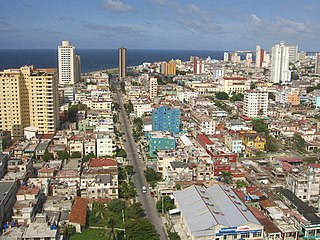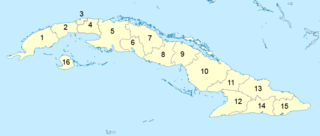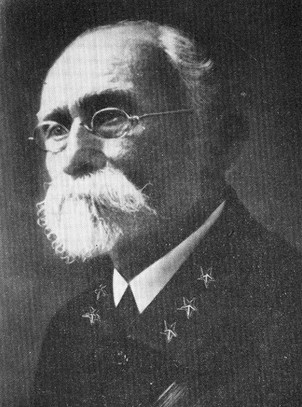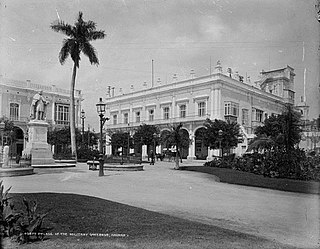
Havana is the capital and largest city of Cuba. The heart of the La Habana Province, Havana is the country's main port and commercial center. It is the most populous city, the largest by area, and the second largest metropolitan area in the Caribbean region. The population in 2002 was 2,137,847 inhabitants, and its area is 728.26 km2 (281.18 sq mi) for the capital city side and 8,475.57 km2 for the metropolitan zone.

Hermosillo, formerly called Pitic, is a city in the center of the northwestern Mexican state of Sonora. It is the municipal seat of the Hermosillo municipality, the state's capital and largest city, as well as the primary economic center for the state and the region. As of 2020, the city has a population of 936,263, making it the 18th largest city in Mexico. The recent increase in the city's population is due to expanded industrialization, especially within the automotive industry.

Administratively, Cuba is divided into 15 provinces and one special municipality. The current structure has been in place since August 2010, when the then-La Habana Province was divided into Artemisa Province and Mayabeque Province.

Cienfuegos is one of the provinces of Cuba. The capital city of the province is also called Cienfuegos and was founded by French settlers in 1819.

Cienfuegos, capital of Cienfuegos Province, is a city on the southern coast of Cuba. It is located about 250 km (160 mi) from Havana and has a population of 178,368 in 2022. Since the late 1960s, Cienfuegos has become one of Cuba's main industrial centers, especially in the energy and sugar sectors. The city is dubbed La Perla del Sur. Despite being known as an industrial city of factories and various nuclear/electrical plants, and the name Cienfuegos literally translating to "one hundred fires", the city actually takes its name from the surname of Asturian-born José Cienfuegos Jovellanos, Captain General of Cuba (1816–19).

Máximo Gómez y Báez was a Cuban-Dominican Generalissimo in Cuba's War of Independence (1895–1898). He was known for his controversial scorched-earth policy, which entailed dynamiting passenger trains and torching the Spanish loyalists' property and sugar plantations—including many owned by Americans. He greatly increased the efficacy of the attacks by torturing and killing not only Spanish soldiers, but also Spanish sympathizers and especially Cubans loyal to Spain. By the time the Spanish–American War broke out in April 1898, the rebellion was virtually defeated in most of Western Cuba, with only a few operating pockets in the center and the east. He refused to join forces with the Spanish in fighting off the United States, and he retired to the Quinta de los Molinos, a luxury villa outside of Havana after the war's end formerly used by captains generals as summer residence.

Santa Clara is the capital city of the Cuban province of Villa Clara. It is centrally located in the province and Cuba. Santa Clara is the fifth-most populous Cuban city, with a population of nearly 245,959.

Moorish Revival or Neo-Moorish is one of the exotic revival architectural styles that were adopted by architects of Europe and the Americas in the wake of Romanticist Orientalism. It reached the height of its popularity after the mid-19th century, part of a widening vocabulary of articulated decorative ornament drawn from historical sources beyond familiar classical and Gothic modes. Neo-Moorish architecture drew on elements from classic Moorish architecture and, as a result, from the wider Islamic architecture.
The Campeonato Nacional de Liga de Fútbol de Cuba is the top football division in Cuba. Currently, it is contested by 16 clubs and is divided into two tournaments – "Apertura" and "Clausura", with the last being the championship tournament. The champion of each tournament, decided via a playoff match ("Final"), are qualified to Supercopa Nacional de Fútbol de Cuba. The league currently has a fixed membership with each club being a representative of a Cuban province, which makes it one of the football leagues that does not have a promotion and relegation process.

Sos del Rey Católico is a historic town and municipality in the Cinco Villas comarca, province of Zaragoza, in Aragon, Spain.
José Manuel ("Lico") Jiménez Berroa was a Cuban pianist and composer.
This article will display the squads for the football tournament at the 2011 Pan American Games in Guadalajara.

Corazón esmeralda, is a Venezuelan telenovela written by Vivel Nouel and adapted by Zaret Romero for Venevisión.

Pompeyo del Valle was a Honduran poet and journalist. De Valle was born in Tegucigalpa, Honduras on October 26, 1928. Son of Carlos del Valle y Soldevilla and Carmen Moncada Rivera, he was born and raised at his maternal grandmother's house in the neighborhood La Ronda, close to the Metropolitan Cathedral and the City Hall. Del Valle made his debut as a journalist in the pages of political newspapers such as, El chilío, Worker’s Voice, Alliance of Democratic Youth, among others. After many adventures and misadventures, Del Valle became involved with the drafting of two major national newspapers at the time, El Cronista and El Día. He became Director of the Journal of the National Autonomous University of Honduras.
The following is a timeline of the history of the city of Cienfuegos, Cuba.
Dairon Alberto Blanco Joseph was a Cuban footballer who played as a midfielder.

The Palm Trees Park, also known simply as Las Palmeras, is a public park in the heart of Pontevedra in Spain. It is the most representative and emblematic green area in the city centre, together with the Alameda de Pontevedra.

The Palacio del Segundo Cabo was built in the last decades of the 18th century, between 1770 and 1791, as part of the urban improvement project around the Plaza de Armas.























